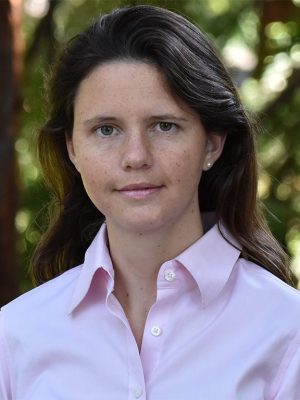
Margaret Chapman
University of California, Berkeley
PhD Candidate
Margaret Chapman is a Ph.D. candidate advised by Dr. Claire Tomlin in the Department of Electrical Engineering and Computer Sciences at the University of California Berkeley. She is grateful to have received the NSF Graduate Research Fellowship and the Berkeley Fellowship for Graduate Study. She earned her B.S. and M.S. degrees in Mechanical Engineering from Stanford University. She is particularly interested in developing decision-making algorithms that protect against rare events with applications to practical design and management of safety-critical systems. Margaret is delighted to be a Rising Stars participant this year! She plans to graduate in the spring or summer of 2020, undertake a post-doctoral position to acquire experimental training in cancer biology, and then become a professor at a research-focused university in the United States or Canada.
Research Abstract:
Triple-negative breast cancer (TNBC) is an especially deadly form of breast cancer that disproportionately affects younger women and women of African ancestry. In collaboration with biologists at the Oregon Health and Science University, I am using systems theory to inform the design of drug schedules for treating TNBC. Since empirical testing of all possible schedules is infeasible, it is imperative to develop quantitative tools to guide the design process. We have derived time-invariant conditions on modeling errors that guarantee cancer cell population decay under a class of tolerable drug schedules. In practice, however, such time-invariant conditions (which are standard in robust control) may be violated sometimes or unnecessarily conservative at other times. To better manage safety-critical systems, such as cancer, we require decision-making tools that protect against rare harmful outcomes under more realistic assumptions about short-term causal events. Towards this critical aim, I am developing a new safety specification approach that attains a tunable balance between robust worst-case analysis and stochastic risk-neutral analysis via risk measure theory. While risk measure theory has become well-established in operations research, it has not yet been extended to practical control or learning systems. To bridge this major gap, my future research lab will develop provably correct, scalable risk-theoretic tools for verification and control under more realistic assumptions about real-world uncertainties. Through in-lab collection of cell culture data and interdisciplinary collaborations, we will transfer these methods to safety-critical applications with deep social impact, including treatment of disease.